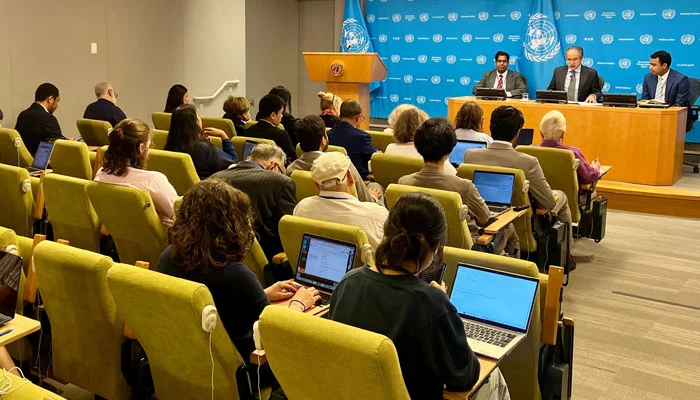UNITED NATIONS: Pakistan has urged the United Nations Security Council to take concrete steps to resolve the decades-old Kashmir dispute, calling it a central issue impeding peace between Pakistan and India.
Addressing a press conference at the UN headquarters in New York after Pakistan assumed the presidency of the Security Council for July, Ambassador Asim Iftikhar Ahmad said the long-standing dispute can no longer be ignored.
“It is time that this issue be addressed. This is not only Pakistan’s responsibility — we are here temporarily as a non-permanent member. It is the responsibility of the Council, particularly its permanent members, to ensure implementation of their own resolutions,” he said.
The Kashmir issue, listed on the Council’s agenda under the “India–Pakistan question,” has been the subject of several UN resolutions which affirm the right to self-determination for the people of Jammu and Kashmir. Ambassador Ahmad said the issue remains unresolved and continues to pose a serious threat to regional peace.
“It has a peace and security dimension, a political and legal dimension, and a profound human rights dimension,” the envoy added. “It is a festering dispute and a source of instability in South Asia.”
The ambassador noted that the Security Council had a responsibility to ensure its decisions are not only symbolic but also implemented. He said Pakistan’s presidency of the Council would focus on promoting multilateralism and peaceful dispute resolution as outlined in the UN Charter.
Pakistan’s UNSC Presidency Priorities
As president of the 15-member Council, Pakistan has scheduled two signature high-level debates:
-
July 22: Promoting International Peace and Security through Multilateralism and Peaceful Settlement of Disputes
-
July 24: UN–OIC Cooperation
Both debates will be chaired by Deputy Prime Minister and Foreign Minister Ishaq Dar, who will also preside over the quarterly open debate on Palestine on July 23.
“These events reflect our commitment to strengthening the multilateral system and emphasizing peaceful diplomacy as the core of international conflict resolution,” Ambassador Ahmad said.
He emphasized that Pakistan’s approach during its presidency is guided by the UN Charter principles: sovereign equality, peaceful settlement of disputes, and respect for international law.
Wider UNSC Agenda
Pakistan’s presidency comes amid ongoing global crises, with the Council also set to address key issues in the Middle East, Africa, Europe, Asia, and Latin America throughout July.
Ambassador Ahmad reaffirmed Pakistan’s intention to advance meaningful dialogue, strengthen mediation tools, and push for the implementation of Council decisions that have long been stalled — notably including those related to Kashmir.
“Our message is simple: unresolved disputes continue to fuel global instability. We must revive trust in multilateralism and the mechanisms the UN has already created,” he concluded.
Pakistan’s current two-year term on the Security Council began in January 2025, marking its eighth tenure as a non-permanent member. The country won its seat with 182 votes out of 193, reflecting strong support from the international community.




